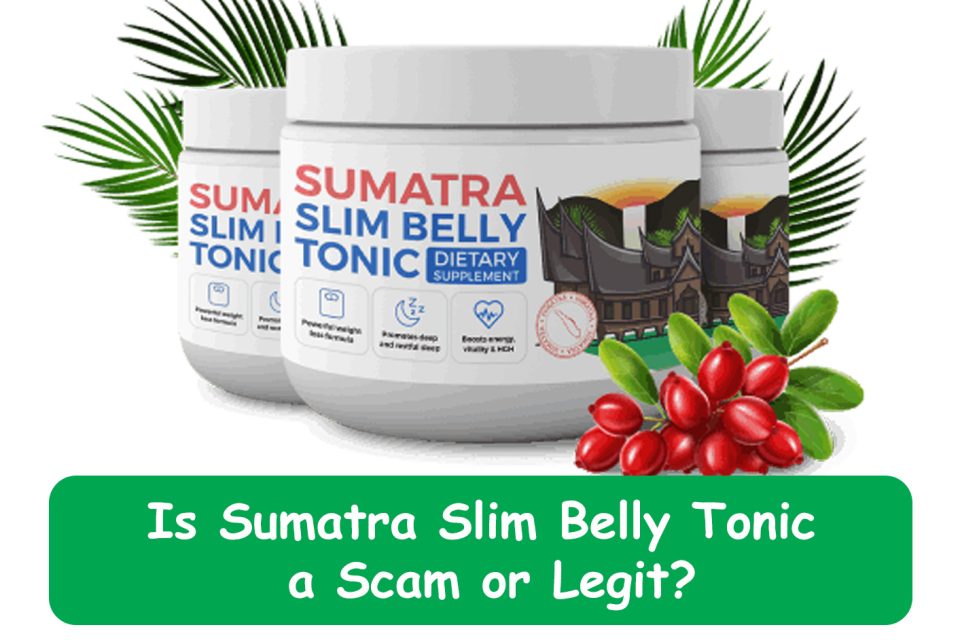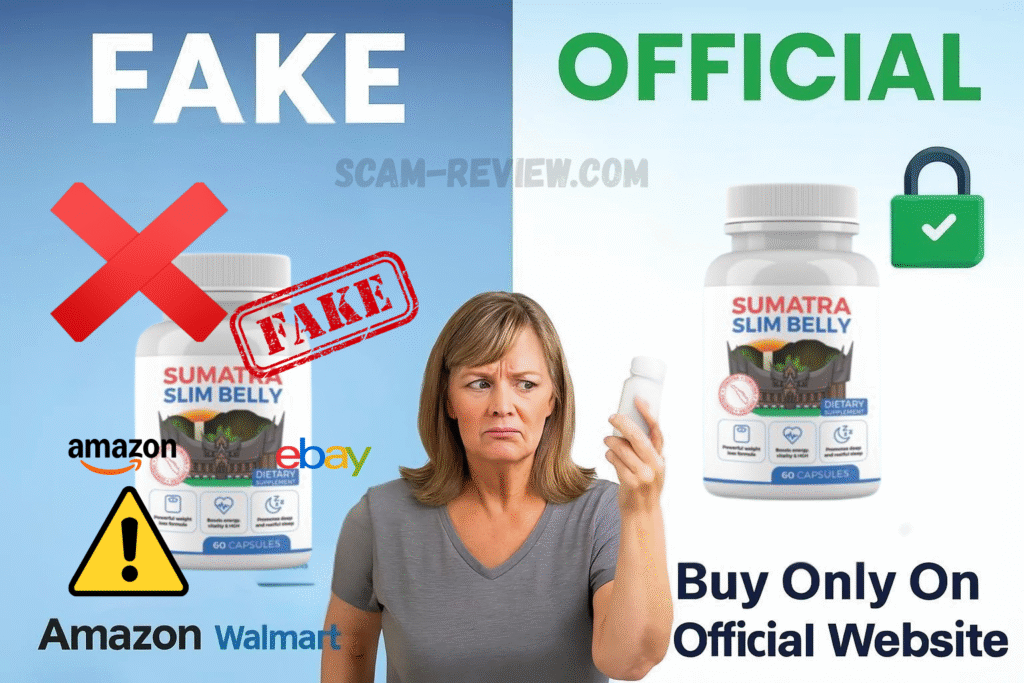Sumatra Tonic Reviews, Scam or Legit? What You Need to Know

Last Updated on 3 days by Supplement
Sumatra Tonic is a so-called weight loss and detox supplement that’s being aggressively promoted across online ads, email campaigns, and social media platforms. Its marketing is filled with exaggerated claims and deceptive messaging, often targeting vulnerable individuals struggling with obesity, sluggish metabolism, or chronic inflammation.
Sumatra Tonic is a dietary supplement that has been created to support healthy metabolism and energy levels, and we firmly believe that it is not a scam but a legitimate product. One of the key reasons for our belief is that it is manufactured by a reputable company that specializes in producing and distributing high-quality dietary supplements. This company has a proven track record of customer satisfaction and ensures that Sumatra Tonic is delivered safely and efficiently to consumers.
Another reason why we consider Sumatra Tonic to be a legitimate product is that it has undergone rigorous testing by a team of professionals. These experts have performed in-depth research and evaluations to determine the safety and effectiveness of the supplement. Based on their findings, they have concluded that Sumatra Tonic delivers on its claims to support energy, vitality, and metabolism. This gives us confidence in its legitimacy and reassures us that it is not a scam.
Furthermore, Sumatra Tonic is made from all-natural ingredients, which significantly reduces any risk to the user’s health. The formula includes herbal extracts and plant-based compounds that have been traditionally used to support energy levels and overall wellness. The absence of artificial chemicals or harmful additives strengthens the supplement’s credibility and makes it a safer option for consumers.
In addition to professional testing and the use of natural ingredients, Sumatra Tonic is manufactured in FDA-approved and GMP-certified facilities. These facilities operate under strict guidelines set by the Food and Drug Administration (FDA) and Good Manufacturing Practices (GMP), ensuring that each batch is produced in a clean, sterile environment and meets high standards for safety and quality.
Considering all these factors, we can confidently state that Sumatra Tonic is not a scam but a legitimate dietary supplement. It is manufactured by a trustworthy company, tested by professionals, composed of all-natural ingredients, and produced in FDA-approved and GMP-certified facilities. These elements provide strong evidence of its authenticity and reliability. Consumers can trust Sumatra Tonic as a safe and effective supplement for enhancing energy and overall wellness.

The promotion of Sumatra Tonic relies on unverified medical endorsements, including a vague “doctor” character featured in its sales videos who claims that the supplement can “flush toxins,” “melt belly fat overnight,” and “reset metabolism naturally.” These claims are allegedly backed by “ancient Sumatran secrets” and a blend of exotic herbs. However, independent research finds no legitimate clinical trials or peer-reviewed studies supporting any of these assertions. Despite bold promises and urgency-driven sales pitches, the product lacks any credible scientific validation.
On the official website, Sumatra Tonic falsely showcases logos from reputable institutions like Mayo Clinic, Harvard Health, and WebMD, implying endorsements that do not exist. There is no evidence whatsoever that these organizations have reviewed, tested, or supported the supplement. The site also uses deceptive pricing strategies, luring customers in with a low initial price, only to upsell expensive “bundle deals,” enforce recurring subscriptions, and hide critical details in fine print. Many of the glowing reviews found on the site are sourced from obscure blogs or affiliate pages, not from trusted consumer platforms.
How the Sumatra Tonic Scam Works: Step-by-Step Breakdown
Step 1: Clickbait Ads & Emotional Triggers
Sumatra Tonic is advertised through paid ads on platforms like Facebook and Instagram. Ads feature exaggerated weight loss claims, fake endorsements, and stories like:
- “Women over 40 are melting fat with this breakthrough discovery.”
- “Doctors are stunned by this one ingredient…”
These ads use emotional pain points — weight loss and detox supplement — to lure in victims.
Step 2: Fake News-Style Landing Page
After clicking, users land on a professionally designed page disguised as a news article or health investigation. These pages contain:
- AI-generated testimonials
- Deepfake-style videos
- Claims that Big Pharma is trying to “suppress” this solution
- Links to “limited-time” offers with heavy discounts
Step 3: Fake Urgency and Scarcity
Once on the product page, users are bombarded with:
- Countdown timers
- “Only 5 bottles left!”
- “Offer expires in 15 minutes!”
These artificial scarcity tactics are used to push people into purchasing without taking time to verify the claims.
Step 4: Hidden Subscription Terms
Users believe they’re making a one-time purchase, but the fine print often enrolls them into an auto-billing program that charges monthly. Many realize only after multiple deductions have hit their account.
Step 5: Product Delivery (or Not)
Some customers report receiving a product with vague labeling and no safety seals. Others never receive anything at all. Even those who do get the product often complain of no noticeable results.
Step 6: No Refund, No Support
When users try to cancel or request a refund:
- Phone numbers don’t work
- Emails go unanswered
- Refund requests are ignored or stalled
The so-called “money-back guarantee” is virtually impossible to claim.
Step 7: Reuse of Buyer Data
Some users report being targeted again with a new product name but identical pitch. This suggests customer data is being resold to other scam supplement marketers. their product, while others complain of receiving unlabeled bottles with no instructions or safety seals.
Key Red Flags:
Unverified Expert Endorsements
Sumatra Tonic’s promotional videos feature a supposed medical expert who endorses the product, but no verifiable credentials or licensing information are provided. This person does not appear in any known medical directories or databases. Such untraceable “experts” are commonly used in scams to create false authority and mislead consumers.
Fabricated Testimonials and Reviews
The website is filled with five-star reviews claiming rapid weight loss, renewed energy, and improved digestion. But reputable platforms like Trustpilot or Amazon either lack reviews for Sumatra Tonic or feature negative experiences, indicating that many of the positive testimonials may be cherry-picked or entirely fabricated.
Misleading Website Claims
Sumatra Tonic’s site displays icons like “Doctor Approved,” “FDA Registered Facility,” and “Scientifically Backed,” but there is no legitimate proof that the product meets any of these standards. These badges are generic, non-verifiable graphics meant to build false trust with potential buyers.
Exaggerated Health Claims
According to the marketing, Sumatra Tonic can “cleanse your liver,” “flush harmful fat,” “detoxify your blood,” and even “reverse aging.” These overblown promises lack clinical evidence and are not backed by any peer-reviewed research. In fact, the FDA has not evaluated these claims, and there is no scientific consensus that such a tonic would deliver any of the stated benefits.
Questionable Website Quality and Redirects
Clicking on Sumatra Tonic ads often triggers a string of redirects, leading to long-form sales pages, autoplay videos, and buried checkout buttons. This is a classic hallmark of scam-style funnels, designed to confuse buyers and suppress transparency.
Misleading Use of Fake Endorsements
The promotional material includes a fabricated doctor whose name does not appear in any medical licensing boards or professional listings. This person’s only digital presence appears to be in ads for Sumatra Tonic — a major red flag signaling a manufactured persona to build trust.
Dubious Purchase Offers and Pressure Sales Tactics
Visitors are pushed into making purchases through “limited-time offers,” fake countdown timers, and “expiring discounts.” These urgency tactics are used to pressure consumers into buying without researching the product or reading the terms, which often include hidden auto-renewal billing.
What to Do If Scammed
If you’ve purchased Sumatra Tonic and suspect you’ve been misled or overcharged, here are the immediate steps to take:
Stop Further Transactions
Contact your bank or credit card provider to cancel recurring charges and request a chargeback if possible. Let them know you may have been targeted by a scam.
Report the Fraud
File a report with the Federal Trade Commission (FTC) at reportfraud.ftc.gov and the Better Business Bureau (BBB) via www.bbb.org. If outside the U.S., report to your country’s consumer protection agency.
Take Screenshots
Before the website changes or is taken down, screenshot every part of your purchase — including email confirmations, product pages, checkout terms, and testimonials. These could be useful for disputing charges or reporting the fraud.
Consult Legal Advice
If significant money was lost or sensitive personal information was shared, it might be worth speaking with a consumer rights attorney to evaluate your legal options.
Warn Others
Post your experience on consumer forums, scam-reporting platforms, and social media. Your warning may help others avoid falling into the same trap.
Conclusion
If you’re thinking about trying Sumatra Tonic, proceed with extreme caution. The product is surrounded by fabricated endorsements, false advertising, and unverified health claims. The site engages in manipulative sales tactics, and there’s a complete lack of transparent scientific backing or trustworthy third-party reviews.
As with any health supplement, always consult a licensed healthcare professional before trying anything new. Don’t be swayed by slick videos, made-up experts, or urgent countdowns. Real health improvements come from evidence-based products — not flashy sales funnels and mythical tonics.
Frequently Asked Questions (FAQ) About Sumatra Tonic
Is Sumatra Tonic a legitimate weight loss supplement?
No. While it uses trendy science-based language, Sumatra Tonic lacks clinical proof, regulatory approval, and verified consumer results to support its claims.
Does Sumatra Tonic have FDA approval?
No. The FDA does not approve dietary supplements. Any claim suggesting otherwise is misleading.
Are there real Sumatra Tonic customer reviews?
Most positive reviews found online appear to be scripted or placed on promotional landing pages. Verified reviews from third-party sources are scarce or negative.
Can Sumatra Tonic cause side effects?
There are no studies confirming safety. Some users report nausea, bloating, and fatigue. Always speak with a doctor before trying unknown supplements.
What’s the biggest red flag about Sumatra Tonic?
The lack of transparency—no company address, no direct customer service, and vague refund policies—suggests it may be a scam.
Why isn’t Sumatra Tonic available on Amazon or Walmart?
Because most major retailers require transparency, verifiable business details, and customer protection policies. Sumatra Tonic likely doesn’t meet those standards.
How does the Sumatra Tonic subscription trap work
Customers think they’re making a one-time purchase, but hidden fine print signs them up for monthly auto-renewals that are hard to cancel.
What should I do if I bought Sumatra Tonic by mistake?
Contact your bank immediately, request a chargeback, and report the product to the FTC. Monitor your accounts and leave public reviews to warn others.